Starlink rockets Musk's SpaceX to $74B valuation
Elon Musk's SpaceX sees its valuation jump 60% in a funding round, with Starlink benefiting from the crash of Alphabet's Loon and Facebook's Aquila.

When will tech valuations come crashing down from orbit? Not today.
Elon Musk's SpaceX raised $850 million last week at $419.99 a share, a penny below the $420 share price Musk made infamous in 2018.
This equity private round now raises the company's valuation to near $74 billion. It was oversubscribed, with the company receiving $6 billion in offers.
Figure 1:  Race for the stars: Starlink – launching above in January 2021 – has helped push SpaceX's valuation into the stratosphere.
Race for the stars: Starlink – launching above in January 2021 – has helped push SpaceX's valuation into the stratosphere.
(Source: Official Space X Photos on Flickr CC2.0)
All this represents a 60% jump in the valuation of Elon Musk's Starlink and Starship business from its last round six months ago.
That previous round saw it raise $2 billion, at a $46 billion valuation.
With Alphabet shutting down its Project Loon, and Facebook previously abandoning its own solar-powered drone Aquila project, SpaceX's plan for low-orbit broadband is looking better and better.
SpaceX launched 60 new Starlink Internet satellites into orbit this week on Monday.
Monday's launch was the third in a month, with another booked for February 25, though in a rare miss, the Falcon 9's first-stage rocket failed to stick its landing on the Of Course I Still Love You drone ship – instead it crashed into the Atlantic Ocean after its sixth and final trip.
A launch scheduled for today has been pushed back, while engineers scrutinize what went wrong with the booster's entry burn on Monday.
Space sums
Starlink's apparently more promising space-based approach to connectivity has attracted its share of competitors.
Jeff Bezos has announced he is stepping down from the top job at Amazon to concentrate on his Blue Origin space venture.
Meanwhile, in the other big astronomic private-sector gamble, Virgin Galactic's valuation has climbed and stalled in the last week after another delayed SpaceShipTwo test flight.
Admittedly, Elon Musk has cited a space-sized financial hurdle ahead for the company over the next year, with capital expenditures far dwarfing revenues coming in.
Currently with 10,000 users, Space X "needs to pass through a deep chasm of negative cash flow over the next year or so," Musk says.
But "once we can predict cash flow reasonably well, Starlink will IPO," he predicts.
Musk believes the Starlink network will take roughly $10 billion a year to build. When complete, though, it will eventually bring in around $30 billion a year, he estimates.
Or ten times the annual revenue of SpaceX's existing rocket business.
Starlink has started accepting $99 a month pre-orders in the US, UK and Canada for what it calls its "Better than Nothing Beta".
The pre-orders are fully refundable, says the website, and "placing a deposit does not guarantee service."
There's a one-off $499 or €499 cost too, for the Wi-Fi router and a small satellite dish which the company's official installation guidelines creatively dubs "Dishy McFlatFace".
The subscription gets customers an average download speed of 100 to 150 Mbit/s.
Mass-market competitors, in areas with fiber broadband, could offer speeds up to 500 Mbit/s for only £62. It's most likely to be an attractive offer in more out-of-the-way areas.
Which could be a good gamble: Over 40% of the globe is without access to the Internet.
For now, the growing Starlink constellation focuses on North America and Britain. But as more satellites are launched, Starlink will be able to offer "near global coverage of the populated world in 2021," pledges the company.
Cometh the hour, cometh the celebrity CEO
If Donald Trump rode Twitter into the White House, Elon Musk has apparently ridden it into the private equity markets.
Musk's command of Twitter, memes and most recently Clubhouse has given Tesla's founder a brand equity allowing him to sell almost 500,000 vehicles last year with a negligible spending on advertising.
Want to know more about cloud-native networks and NFV? Check out our dedicated cloud-native networks and NFV content channel here on Light Reading.
Like Steve Jobs before him, Musk attracts pungent criticism of his personal "reality distortion field."
Low-orbit broadband still remains a highly experimental technology where fortunes can shift quite quickly. But for the moment at least, Starlink seems to be leaving its rivals Earth-bound.
Related posts:
— Pádraig Belton, contributing editor special to Light Reading
About the Author(s)
You May Also Like




_International_Software_Products.jpeg?width=300&auto=webp&quality=80&disable=upscale)







